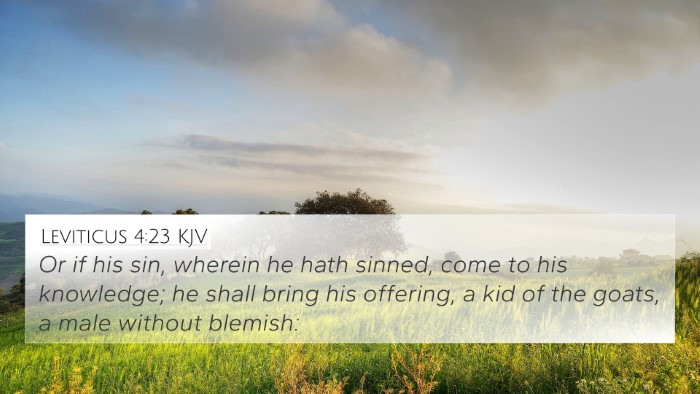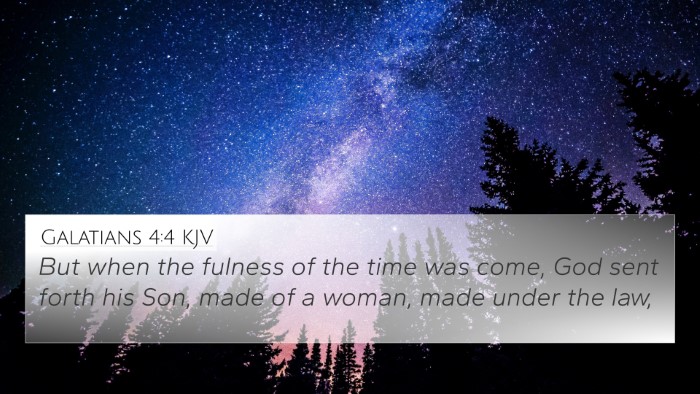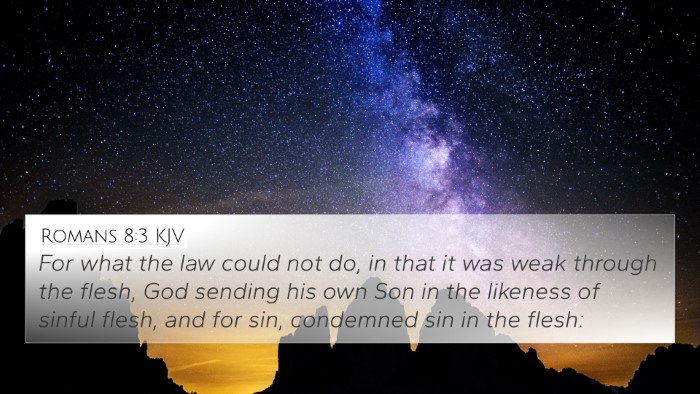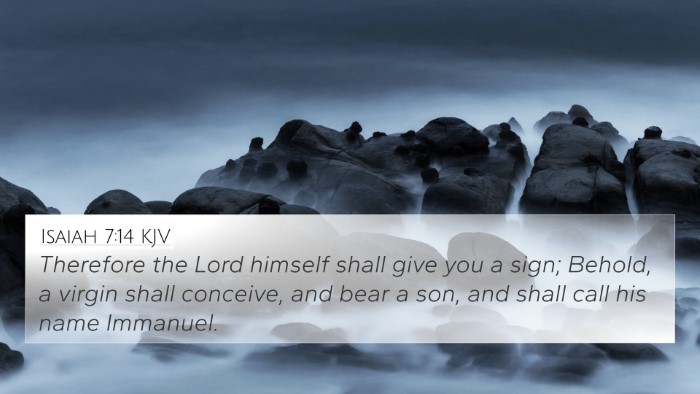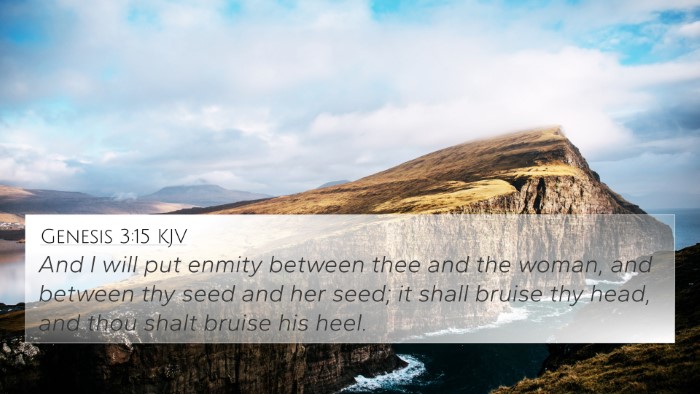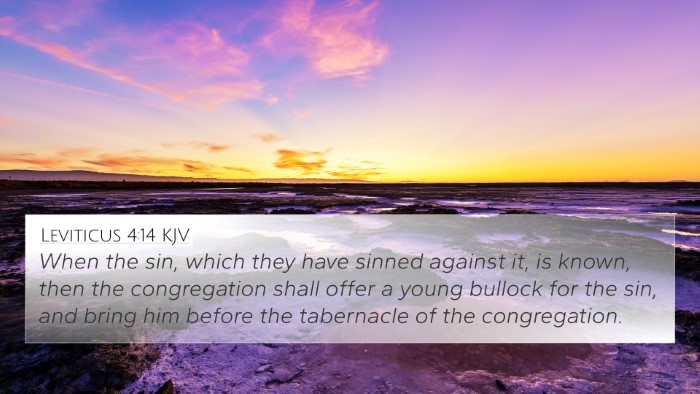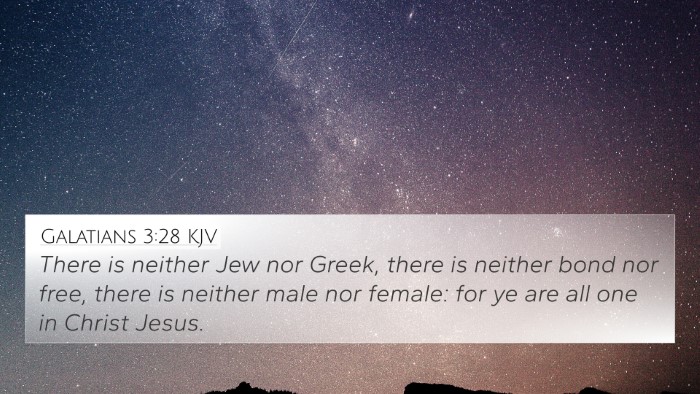Understanding Leviticus 4:28
Leviticus 4:28 states: "And if his sin, which he hath sinned, come to his knowledge; then he shall bring his offering, a kid of the goats, a female without blemish, for his sin which he hath sinned." This verse is part of the sacrificial laws in the Book of Leviticus, which provide instructions on how the Israelites were to seek atonement for unintentional sins.
Commentary Insights
The interpretation of this verse draws from various public domain commentaries, providing a deeper understanding of its significance.
Matthew Henry's Commentary
Matthew Henry emphasizes the importance of recognition in sin. He notes that the acknowledgment of sin is the first step in the process of atonement. He explains that this verse highlights how one must not only realize their wrongdoings but also take the necessary steps to correct them through the prescribed offering. This reflects the seriousness of sin and the importance of seeking forgiveness.
Albert Barnes' Commentary
Albert Barnes expands on the type of offering mentioned in the verse. He explains that a "female without blemish" symbolizes purity and the need for a flawless sacrifice to atone for sin. This underscores the broader biblical principle that sin requires a cost, and the offering serves as a substitute for the sinner. Barnes also draws parallels with the New Testament, suggesting that Christ, as the ultimate sacrifice, fulfills this requirement of perfection.
Adam Clarke's Commentary
Adam Clarke provides insights into the procedural aspects of the sacrificial system. He notes the significance of bringing the offering and the communal aspect of sin among the Israelites. Clarke points out that this law not only addresses individual sin but also emphasizes accountability within the community, as sin affects the entire body of Israel. This highlights the communal responsibility for sin and the collective need for atonement.
Thematic Connections
The thematic implications of Leviticus 4:28 extend beyond the immediate context. Below are connections to key themes in scripture:
- Sin and Atonement: The verse aligns with the overarching theme of sin and the need for atonement, as seen in Romans 3:23-25, which highlights the universality of sin and the redemptive work of Christ.
- Offerings and Sacrifices: Leviticus 1:3-4 discusses the procedure for offerings, creating a direct link to the requirements of Leviticus 4:28 regarding sacrifices.
- Purity and Perfection: In Hebrews 9:14, the concept of Christ's sacrificial purity as the ultimate offering is emphasized, paralleling the requirements in Leviticus.
- Personal Acknowledgment of Sin: Psalm 51:3 illustrates the importance of acknowledging one’s sin, resonating with the recognition required in Leviticus 4:28.
- Community and Accountability: Galatians 6:1 addresses the need for communal support and accountability in addressing sin, reflecting Clarke’s insights on community responsibility.
- Old Testament to New Testament Connections: 1 Peter 1:19 speaks of Christ as a lamb without blemish, connecting the sacrificial practices of Leviticus to the new covenant.
- The Scope of Sin: Isaiah 53:6 refers to all humanity straying, a reminder of the systemic nature of sin and the required acknowledgment echoed in this verse.
- God’s Desire for Repentance: 2 Chronicles 7:14 calls for humility and turning from wicked ways, bridging the Old Testament with the call for repentance in Leviticus.
Cross-References and Related Verses
For deeper study, the following cross-references are critical for understanding the context and implications of Leviticus 4:28:
- Leviticus 1:3-4 - Instructions for offerings.
- Leviticus 16:5-10 - The Day of Atonement and its significance.
- Romans 3:23-25 - Universality of sin and need for redemption.
- 1 Peter 1:19 - Christ as the perfect sacrifice.
- Psalms 51:3 - Acknowledgment of sin and contrition.
- Hebrews 9:14 - Redemption through Christ's sacrifice.
- Galatians 6:1 - Mutual accountability in community regarding sin.
- Isaiah 53:6 - All have gone astray, tying back to the need for atonement.
Conclusion
Leviticus 4:28 serves as a pivotal verse in understanding the sacrificial system and the necessity of atonement in the face of sin. The insights provided by Matthew Henry, Albert Barnes, and Adam Clarke collectively underline the importance of recognizing sin, the purity required for atonement, and the communal nature of responsibility. These themes resonate throughout scripture, creating a rich tapestry of understanding that connects various biblical teachings and emphasizes the overarching narrative of redemption.



